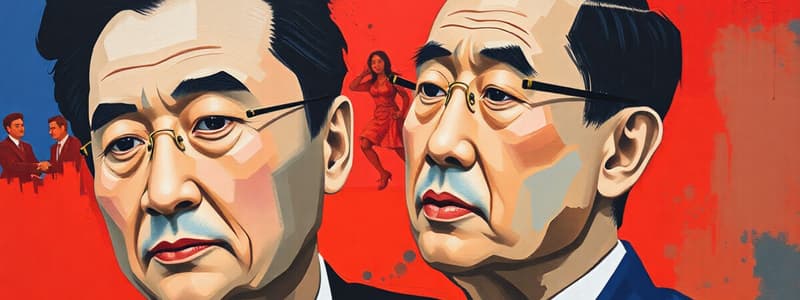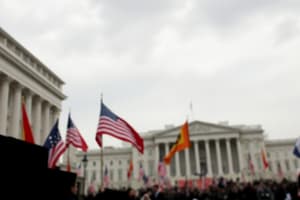Podcast
Questions and Answers
What perspective did the speaker mention about globalized trade and investment?
What perspective did the speaker mention about globalized trade and investment?
- It has only benefited developed nations.
- It has led to isolation of countries.
- It has resulted in widespread poverty.
- It has produced prosperity and peace in many regions. (correct)
How did the speaker contrast the views from different geographical locations?
How did the speaker contrast the views from different geographical locations?
- Developed areas are more representative of global conditions.
- The views from war zones highlight different realities. (correct)
- Geographic differences do not affect perspectives.
- Views from developed areas are more exaggerated.
What was mentioned as a significant issue faced in certain regions of Africa?
What was mentioned as a significant issue faced in certain regions of Africa?
- Lack of technological advancements.
- Economic overdevelopment.
- Environmental sustainability.
- Massive violence against women and children. (correct)
What did the speaker suggest about the number of conflicts over the last two generations?
What did the speaker suggest about the number of conflicts over the last two generations?
What conclusion did the speaker draw regarding the need for new ideas?
What conclusion did the speaker draw regarding the need for new ideas?
What was the outcome of the Arab Spring according to the discussion?
What was the outcome of the Arab Spring according to the discussion?
What is suggested to be a contributing factor to rising inequality?
What is suggested to be a contributing factor to rising inequality?
According to the discussion, what challenge does political equality face?
According to the discussion, what challenge does political equality face?
What environmental impact is discussed as a challenge for liberal democracy?
What environmental impact is discussed as a challenge for liberal democracy?
How does one speaker view the world’s safety over the past 25 years?
How does one speaker view the world’s safety over the past 25 years?
What dilemma is posed regarding market capitalism and liberal democracy?
What dilemma is posed regarding market capitalism and liberal democracy?
What argument does one participant make about the legitimacy of the Chinese government?
What argument does one participant make about the legitimacy of the Chinese government?
What is one implication of the 'end of history' thesis mentioned?
What is one implication of the 'end of history' thesis mentioned?
What is one forecast for the world’s future as discussed?
What is one forecast for the world’s future as discussed?
What does one participant argue about democracy and a broad middle class?
What does one participant argue about democracy and a broad middle class?
What is a predicted outcome of climate change discussed during the talk?
What is a predicted outcome of climate change discussed during the talk?
What is indicated regarding the potential for major wars in the future?
What is indicated regarding the potential for major wars in the future?
What role does technology play in the discussion about economic inequality?
What role does technology play in the discussion about economic inequality?
What do the speakers suggest as intrinsic challenges to liberal democracy?
What do the speakers suggest as intrinsic challenges to liberal democracy?
What was Francis Fukuyama's main assertion regarding the evolution of human societies?
What was Francis Fukuyama's main assertion regarding the evolution of human societies?
What major events influenced Fukuyama's perspective in 1989?
What major events influenced Fukuyama's perspective in 1989?
What aspect did Melissa Lane believe was overlooked by Fukuyama's thesis?
What aspect did Melissa Lane believe was overlooked by Fukuyama's thesis?
What did Simon Sharma suggest was a surprising element in the evolution of societies since Fukuyama's thesis?
What did Simon Sharma suggest was a surprising element in the evolution of societies since Fukuyama's thesis?
What was discussed regarding democracy in the years between the 1970s and the 2008 crisis?
What was discussed regarding democracy in the years between the 1970s and the 2008 crisis?
What does Simon Sharma imply about democracy's relationship with those in the grip of fundamentalism?
What does Simon Sharma imply about democracy's relationship with those in the grip of fundamentalism?
What conclusion did Fukuyama reach about the direction of history in his original thesis?
What conclusion did Fukuyama reach about the direction of history in his original thesis?
What did Lane note about the Arab Spring in terms of its direction?
What did Lane note about the Arab Spring in terms of its direction?
What did the panel suggest about the persistence of authoritarianism?
What did the panel suggest about the persistence of authoritarianism?
What role does religious fanaticism play, according to the discussions?
What role does religious fanaticism play, according to the discussions?
How does Simon Sharma feel about the predictions made in Fukuyama's thesis?
How does Simon Sharma feel about the predictions made in Fukuyama's thesis?
What ongoing trend did the panelists agree was still powerful in the world?
What ongoing trend did the panelists agree was still powerful in the world?
What was Fukuyama's original thesis later questioned about?
What was Fukuyama's original thesis later questioned about?
What was suggested concerning the popular mobilization in the Middle East?
What was suggested concerning the popular mobilization in the Middle East?
Flashcards
Arab Spring failure
Arab Spring failure
The Arab Spring uprisings, despite initial hopes, ultimately resulted in authoritarian regimes replacing previously existing ones.
Muslim Brotherhood
Muslim Brotherhood
A political-Islamic group that played a role in the Arab Spring transitions into authoritarianism.
Liberal Democracy & Market Capitalism
Liberal Democracy & Market Capitalism
The pairing of a political system guaranteeing individual freedoms and rights while allowing private ownership and trade.
Political Equality and Economic Inequality
Political Equality and Economic Inequality
Signup and view all the flashcards
Environmental Pressures
Environmental Pressures
Signup and view all the flashcards
Rising Inequality
Rising Inequality
Signup and view all the flashcards
Middle Class Decline
Middle Class Decline
Signup and view all the flashcards
Technological Advancements
Technological Advancements
Signup and view all the flashcards
Resource Wars
Resource Wars
Signup and view all the flashcards
Climate Change
Climate Change
Signup and view all the flashcards
Global Warming
Global Warming
Signup and view all the flashcards
Political Impact
Political Impact
Signup and view all the flashcards
Economic Impact
Economic Impact
Signup and view all the flashcards
Global Safety
Global Safety
Signup and view all the flashcards
End of History thesis
End of History thesis
Signup and view all the flashcards
Fukuyama's Prediction
Fukuyama's Prediction
Signup and view all the flashcards
Liberal Democracy
Liberal Democracy
Signup and view all the flashcards
Market Economy
Market Economy
Signup and view all the flashcards
Modernization Process
Modernization Process
Signup and view all the flashcards
Religious fanaticism
Religious fanaticism
Signup and view all the flashcards
End of History
End of History
Signup and view all the flashcards
Authoritarian Governments
Authoritarian Governments
Signup and view all the flashcards
Alternative Future
Alternative Future
Signup and view all the flashcards
Sharia Law
Sharia Law
Signup and view all the flashcards
Arab Spring
Arab Spring
Signup and view all the flashcards
Civil War
Civil War
Signup and view all the flashcards
Cold War
Cold War
Signup and view all the flashcards
Berlin Wall
Berlin Wall
Signup and view all the flashcards
Communist Utopia
Communist Utopia
Signup and view all the flashcards
Global Democratization
Global Democratization
Signup and view all the flashcards
Globalization's Peace?
Globalization's Peace?
Signup and view all the flashcards
Counterargument to Globalization's Peace
Counterargument to Globalization's Peace
Signup and view all the flashcards
End of History Debate
End of History Debate
Signup and view all the flashcards
New Ideas Needed
New Ideas Needed
Signup and view all the flashcards
Globalized Trade & Investment
Globalized Trade & Investment
Signup and view all the flashcards
Study Notes
Fukuyama's "End of History" Revisited
- Fukuyama's 1989 thesis posited that history was trending towards liberal democracy and market economies.
- This wasn't about the end of history as termination, but the direction of human societal evolution.
- The thesis predicted a shift away from communist ideals.
- 25 years later, the predicted outcome seems likely, but challenges remain.
Tensions Between Liberal Democracy and Capitalism
- Ongoing tensions between liberal democracy and capitalism are evident in today's world.
- The thesis failed to predict the resurgence of religious fanaticism, tribalism, and nationalism.
- These forces are viewed as obstacles to the envisioned global progress toward liberal democracy.
- Economic inequality, fueled potentially by technological advancement, is cited as a threat to broad-based societal support for democracy.
- Global environmental pressures add further complexity and strain on the existing model.
The World Today: Challenges and Contradictions
- Despite widespread advancement and adoption of democratic principles, significant pushback against democracy continues in certain regions.
- The world is not necessarily becoming safer. Resource competition and environmental degradation present serious long-term threats.
- The resurgence of religious extremism, ethnic conflict, and tribalism significantly complicates the global picture.
- While the number of democracies has increased, many face issues of corruption, responsiveness, and maintaining political equality amidst economic inequality.
A Multifaceted View
- The presenter's viewpoint and perspectives reveal a multifaceted understanding of the current global environment.
- Data on violence levels over the last 25 years suggests a decrease in intensity, potentially contradicting the idea of a worsening world situation.
- The argument persists that despite the challenges, globalized trade and investment have brought prosperity to many regions.
- Ultimately, the question remains about the long-term future and whether existing models can successfully address contemporary challenges.
Studying That Suits You
Use AI to generate personalized quizzes and flashcards to suit your learning preferences.




